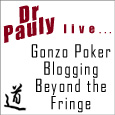Thursday, January 06, 2005
I just finished eating some delicious stuffed shells and garlic bread (leftovers from my sis-in-law Manda, and damn can she cook). Before this wonderful meal, I had just finished placing 1st for the 2nd day in a row in a cheap-o $5+1 10-player Sit n Go on Empire. Pardon my surprise, but coming off of such a bad month of online poker, to rack up two first-place finishes back to back is a shock to my system! (It seems whenever I hit a good streak, Randy hits the downside, and vice versa. He had a pretty good month going online till recently).
The one thing that is different in tonight's game versus the one I won yesterday: I was catching some really great cards yesterday. Today - the cards weren't spectacular. Nothing to write home about. So what is it about today that went well for me? Are there any similarities between today's play and how I played yesterday? Ahh, Poker Tracker to the rescue!
I'm a nut for statistics, so PT is just cool beyond my wildest dreams.
First, the numbers. I saw 60 hands in this game.
Voluntarily put $ in the pot: 25%
Won $ when saw flop: 60%
Went to Showdown: 35%
% Win at Showdown: 85.71%
Pre-flop raise: 10%
Post-flop aggression factor: 4.0
Total aggression factor (including pre-flop): 1.47
All in all, very similar numbers (though I "felt" more aggressive yesterday than today - even though today's aggression numbers post-flop were slightly higher). I went to showdown a bit more today - 35% versus yesterday's 18%. Almost won all of them - 6 out of 7 hands that I showed down, I won. Nice.
I can't say I was really catching cards - the hands I did well on I basically flopped the best hand and it held up. The audience was a bit less passive than yesterday's - a lot of callers and raisers. I did my best to work that to my advantage though, letting them beat each other up when I held a marginal hand.
Surprisingly, ALL of my hands played were either in the blinds, or 1, 2, or 3 off the button. All late-position hands. I didn't do that consciously, though I was being purposely conscious of my position. (Been working on that). I didn't play any hands in middle to early position (aside from the blinds). Oddly, again, most of my money came from hands played in the SB or BB: 5,500 versus 2,000 from other positions.
I saw AK 3 times in this game - it was nice to see it finally hold up for me instead of get cracked all crazy like it has been lately. Won all 3 hands.
I think my best work in this game was in reading players (though I did once again steal a couple blinds at bubble-time, and everyone gladly surrendered them to me). Granted, I've got the wonderful PT program that shows me very easily what hands people have shown down, and various other statistics, but today I felt like I really knew how to apply some of those stats.
For example, the player to my right (on-screen left) was pretty aggressive post-flop, but folded easily. Early in the game I folded a couple hands to his aggressive bets, and soon I saw a pattern in his choices of playable hands. He really had a tendency towards the suited cards - anything suited. Didn't have to be a connector, didn't have to have a face card. In one early hand that I folded to him, he bet very aggressively at a board with 2 hearts. Luckily another player showed him down, and he didn't hit, so I scribbled on my notepad his action of betting his flush draw very aggressively. (His mistake in that hand was, he didn't back down when he missed the draw, and had he been paying attention, he was up against a rather tight player, who inevitably had the nuts).
I continued the game armed with this knowledge: he loves the suited cards, bets 4-to-the-flush aggressively, and folds rather easily.
Then came this hand. I'm in the big blind holding A3 offsuit. Everyone folds, small blind (my flush draw loving opponent) calls. I check and we see a flop. Flop comes Ah - 6h - 9c. I hit my top pair, but there's a heart draw on board. He'll surely bet if he's holding 2 hearts. Sure enough, he bets out 125 into a pot of 100. Figuring he's on the draw, I call it. The danger here is of course that I have a really crappy kicker to go with my Ace. The turn comes a 3c. I've hit two pair, but now there are 2 clubs on board. Right now I have him clearly pegged for the heart flush draw. He checks to me (I knew it!), and I bet out 150. He calls. Let's see the river! 8c. Ouch - 3 clubs on board, so if I'm misreading him, this could hurt. (There's also a goofy 3-to-a-straight on board, but that's not my fear at this point). He bets out 85 - very weak bet into a 650 pot, and at that point I'm fairly certain I've read the hand correctly, though I decide to just call (in case he's got that busted up straight or club flush). Sure enough, he's holding Q5 of hearts, and I take the pot with my Aces and threes.
I was really happy with my read on this play, having noticed my opponent's choices of hands and betting patterns with those hands. He was very consistant - most players I imagine aren't as easy to read, but I'd also like to think that my attention to the skill and art of observation helped. I'm working on it! It's kind of like getting an "A" on a big test. I felt good about that hand.
The thing with reading players online is that there are so many factors that have nothing to do with a player's skill level or intentions that it's a lot more tricky (or, more accurately, a lot more inaccurate) than reading a player face to face. For example - all of the books say to pay attention to the speed at which someone online bets or check with. If they take a long time to make a decision, they're thinking, and that indicates weakness. Personally, I don't like to make any reads based on how SLOWLY someone acts, primarily because the internet is so flaky in terms of bandwidth that any little hiccup on any of the thousands of routers on the internet can cause that little pause. The person may have acted immediately, but due to network congestion, we don't see it immediately. (This doesn't include when the player actually hits the "time" button). Secondly, it is so easy to get distracted playing online that often, the pauses in decision making are not game-related. I can't tell you how many times I've jumped up to run to the kitchen to grab another can of pop from the fridge, and hear the little alarm sound to come back and make a decision on my hand. Sure, I run back as quick as I can - but I wasn't sitting in my chair pondering a move - I was chasing down a can of pop! Other distractions are equally likely - the phone ringing in the middle of a hand (how many times have you been juggling the phone on your shoulder while trying to type in a bet and work the mouse saying, "yeah yeah lemme call you back, I have pocket kings!") I imagine there are people playing cards that have wives, husbands, children and pets all around requiring random blurbs of attention, or a TV show that sucks you in, in between hands. Then there's the internet - surfing the web, or playing in multiple poker tables. All of those things cause delays in reacting to a hand - and none of them give any true indication of strength or weakness. In my book, NONE of them are to be taken as tells. The only time I read "slow to act" as a possible tell is when someone has specifically requested TIME in a hand.
I will, however, read quickness to act as a potential tell. It's not quite a science, but some useful information can be gained if you look for patterns. The people that click the little boxes to declare their action before it's their turn to act, for example: you can tell someone who had the "check" box checked because the game just instantaneously checks them with no hesitation. It almost skips right over them. Most books say that's a sign of weakness. I think a little bit more into it - I take it as a sign that this person decided very quickly to check the hand, purposefully NOT betting, and also not clicking the check/fold button. They want the opportunity to stay in the hand, should it happen to be raised. This can mean weakness - but it can also be a passive player who has a hand, and just isn't the betting/raising type. Depending how I've seen this person play, I'll read that action either way. The insta-bet is the same sort of thing; the person obviously decided ahead of time that the hand was worth betting, even before seeing anyone else act. Usually strength, unless you have a bluffer or oober-aggressive player on your hands.
I don't use those pre-decision buttons, except to fold. I'll wait for the action to get to me, pause a moment, and hit whatever button I'm going to hit. First of all, I don't want to give that information away to players. Secondly, I don't want to make those kinds of decisions before I have seen how everyone else has acted. How can you truly make a decision to call, bet, or raise, before you have seen what other players ahead of you have done (particularly in late position)? Getting into the habit of using those buttons really equates to getting into a bad habit of not taking other players' actions into account in making your own decisions. So, I don't use those buttons. I'm really glad that I never got into the habit of using them - it's probably a hard habit to break.
Reading people online is tough, and I much prefer face-to-face poker to online poker. But, I enjoy playing online, and in order to be at all successful, you've got to learn to read people online as best you can. I think it's primarily a process of recognizing patterns. I suppose that is also true in a live game. I'm rather read a live person than a bunch of pixels any day :)









